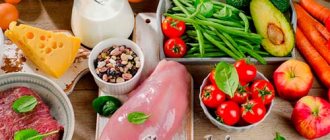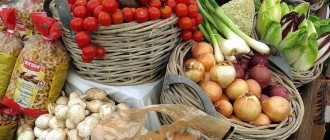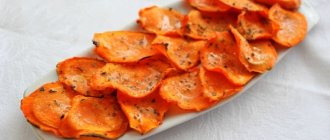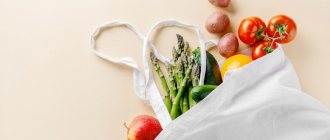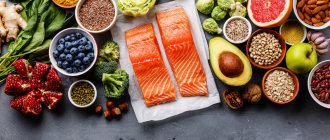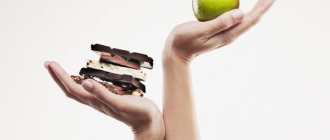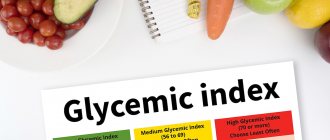Carbohydrates are unfairly blamed for all the troubles of people who are trying to lose weight. The problem is that today you can read about the dangers of almost any product and drown in a sea of false information without ever getting to the bottom of it. But you can't fool science. There is no evidence that carbohydrates are harmful for weight loss. In this article I will tell you whether you should be afraid of carbohydrates or whether you need to make friends with them, how they affect weight loss, how many carbohydrates you should consume and from what products. You'll understand what a healthy weight loss approach looks like and dispel a few nutrition myths in your head.
What are carbohydrates in food
Carbohydrates are macronutrients in food, just like proteins and fats.
The breakdown product of carbohydrates in our body is monosaccharides (glucose, fructose and others). Or rather, even so - any carbohydrate from food will break down in our body to glucose, fructose and other simple carbohydrates included in its composition - like sugar, like whole grain bread, and the oxidation of 1 g of carbohydrates will release 4 kcal of energy (but more on that later). The body doesn't care where we got this or that carbohydrate from.
Table 1. Classification of carbohydrates
| Monosaccharides | Disaccharides | Polysaccharides |
| Glucose and fructose | Sucrose, maltose, lactose | Starch, fiber, cellulose, chitin, glycogen |
| They consist of one molecule, so they are quickly absorbed. | They consist of two molecules of monosaccharides and require a longer time to digest and assimilate compared to monosaccharides. | They consist of tens, hundreds, thousands of monosaccharides. They take a long time to digest and absorb, unlike simple carbohydrates. Contains many nutrients (proteins, vitamins and minerals). |
This is the most accessible source of energy from food for our body. That is, it is easier for the body to use energy from carbohydrates than from fats and proteins. However, this does not mean that the body does not burn fats and proteins for its needs, it is just that carbohydrates are used first when performing any work.
Carbohydrates in our body are stored as glycogen in the muscles and liver. Glycogen in muscles (it contains 1-3% of the total weight of muscles) ensures their motor activity, liver glycogen (its content is approximately 100-120 g) serves to maintain the functioning of body systems. In total, approximately 350-500 g of glycogen can be accumulated in the body of an adult, or, if converted into calories, 1400-2000 kcal, which the body uses to support itself and perform physical work - breathing, maintaining normal blood sugar levels, brain function, walking , hand movements, doing exercises, etc.
Each gram of glycogen in the muscles holds an additional 3-4 g of water. When glycogen stores are replenished, muscles appear full. This also explains the quick results of low-carb diets. By severely limiting your carbohydrate intake, you actually get rid of water, reducing your weight significantly. However, the body will still equalize the water content in the body and the weight may even increase compared to the original if you do not maintain a calorie deficit. Read about the effect of water balance on body weight and what calorie deficit is needed to lose weight.
Are fast carbohydrates always bad carbohydrates?
Do not forget that foods with simple and complex carbohydrates contribute to:
- maintaining physical activity;
- supplying the body with vitamins and minerals;
- obtaining dietary fiber;
- stabilization and improvement of intestinal condition;
- improvement of cognitive (cognitive) functions.
You already know that waffles are worse than brown rice, since the first product contains fast (or simple macronutrients), and the second product contains slow carbohydrates.
Unprocessed cereal contains fiber and beneficial microelements, which will not cause a strong jump in blood sugar and will ensure satiety for a long time. But waffles will provoke a high insulin surge, energy and the return of hunger. However, simple carbohydrates should not always be called “bad”.
Carbohydrate cycle
To understand that foods with fast carbohydrates are not always harmful, you need to remember the macronutrient cycle in the body:
- glucose is synthesized from consumed carbohydrates and enters the blood;
- an increase in the amount of glucose notifies the pancreas of the need to produce insulin;
- insulin forces cells to let in glucose to be used as energy or stored in liver cells or muscles;
- blood glucose levels decrease, sending a signal to the pancreas to produce glucagon;
- glucagon sends a signal to the liver and muscle tissue that it is time to return glycogen and synthesize glucose back into the blood to be used as energy.
Are carbohydrates good or bad for weight loss?
Carbohydrates are neither good nor bad for weight loss. To be healthy, you must have them on a diet. What is important for losing weight is a calorie deficit. If you get less energy from food than your body spends per day, you will lose weight. Read a detailed article about energy balance, where I talk about how this principle works in life.
There is no need to exclude carbohydrates from your diet; you need to monitor the caloric content of your diet (read how to count calories correctly).
It is generally dangerous to cut carbohydrates to zero in the long term, since they, in addition to energy, have protective, regulatory and construction functions.
Why are carbohydrates needed?
Carbohydrate is a compound that contains carbon, hydrogen and oxygen. They are known to us as sugar, starch and dietary fiber. Carbohydrates provide an average of about 4 kcal per gram. Want to count the calories of your food? Simply multiply 4 by 20. For example, if you eat a meal that contains 20 grams of carbohydrates, you will receive 80 kcal.
Kcal or kilocalories represent the heat required to raise the temperature of 1000 g (1 liter) of water by 1 degree Celsius or 4 glasses of water by 2 degrees Fahrenheit. That is, carbohydrates are one of the main sources of fuel for humans. Without carbohydrates in our body, we would walk like zombies, if, of course, we could still walk.
Our brain requires carbohydrates to function, and our muscles also require carbohydrates to support intense physical activity such as bodybuilding. Eating enough carbohydrates throughout the day is important because liver glycogen is used up in about 18 hours when carbohydrates are not consumed.
How many carbohydrates do women and men need per day when losing weight?
The amount of required carbohydrates on a diet for men and women is calculated on a residual basis. First of all, proteins are calculated, then fats, then carbohydrates. The order is:
- We determine the amount of protein on a diet from this article.
- We give 30-35% of the caloric content of the diet to fats, but not less than 1 g per 1 kg of current weight for girls.
- All remaining calories will be covered by carbohydrates.
Let's use examples. A woman weighing 75 kg wants to lose weight to 65 kg and found out that to do this she needs to consume no more than 1600 kcal (how to determine how many calories you need to consume per day to lose weight). She also found that she needed 1.8 grams of protein. We multiply 1.8 by the desired weight (I wrote here why you need to calculate protein by the desired weight):
1.8 x 65 = 117 g of protein or 117 x 4 = 468 calories from protein, where 4 is the calorie content of 1 g of protein.
Next we count fats:
1600 x 0.35 = 560 kcal or 560/9 = 62 g of fat, where 9 is the calorie content of 1 g of fat.
But it’s better for girls not to go below the level of 1 g of fat per 1 kg of weight, so we take 75 g of fat or 675 calories as the norm.
And finally, we count carbohydrates using the residual principle:
1600 – 468 – 675 = 457 kcal or 457/4 = 114 g of carbohydrates, where 4 is the calorie content of 1 g of carbohydrates.
100 g of carbohydrates is the minimum amount , or rather 100 g of glucose is needed by the brain daily for normal functioning [1]. Therefore, do not go below this figure.
This plan is a healthy approach to dieting that will allow you to lose weight, maintain muscle, and feel good throughout your weight loss journey. Read how to calculate the duration of a diet.
Simple carbohydrates: black list
Monosaccharides include:
- Glucose or grape sugar is what is converted into glycogen, participating in the formation of fat reserves. Its molecules are found in abundance in sweets, honey, fruits, etc.
- Lactose is a substance obtained by our body along with dairy products, necessary for full development in early childhood.
- Fructose is another simple carbohydrate processed by the liver into glycogen. It is absorbed by our body much better than sucrose and is found in berries, honey and sweet fruits.
- Sucrose - its excess increases the formation of fats, leads to increased cholesterol levels and deterioration of intestinal microflora.
Now let’s remember what those who want to lose weight should not include in their daily diet, and list the foods that contain harmful fast carbohydrates:
- cakes;
- cakes;
- pies and buns;
- candies;
- cookie;
- all confectionery products made from white flour;
At the same time, we should not forget that sweet fruits containing fiber should not disappear from our diet: it is enough to consume them before 16:00, minimizing the risk of excess weight gain. Don’t forget to count the calories you eat per day, and the weight will begin to decrease, bringing you closer to your cherished goal - an ideal figure.
Carbohydrate-rich foods
Well, now let's move on to the sources of carbohydrates in food. We decided that carbohydrates are necessary and important for weight loss due to the vitamins, minerals and fiber they contain.
List of foods containing complex/slow carbohydrates
- Fruits (apples, apricots);
- Vegetables (tomatoes, cucumbers, greens, broccoli, cabbage, peppers);
- Nuts and seeds (sunflower and pumpkin);
- Cereals.
Be careful with nuts - they contain a lot of fat and are very high in calories.
About grains separately, since this is a large group of products:
- Cereals (wheat, barley, rye, rice, oats, corn, spelt) and cereal products (flour and flour products, cereals, bulgur and others);
- Buckwheat;
- Quinoa;
- Legumes (peas, beans, soybeans, lentils).
Among grains there are products with different glycemic index:
Everything below 40 units is slow carbohydrates, everything above is fast
Slow carbohydrates in legumes:
| The product's name | Glycemic index | Carbohydrate content in grams per 100 g |
| Beans | 40 | 8,1 |
| Lentils | 25-41 | 20 |
| Dry green peas | 25 | 13 |
| Beans | 15-27 | 4,4 |
Slow carbohydrates in seeds and nuts:
| The product's name | Glycemic index | Carbohydrate content in grams per 100 g |
| Almond | 15 | 11 |
| Walnuts | 15 | 12 |
| Cashews, hazelnuts, peanuts | 15 | 15 |
| Sunflower seeds | 8 | 3,4 |
List of foods containing simple/fast carbohydrates
- Various types of sugar - table, cane, brown and others;
- Syrups, jam, honey, marmalade;
- Starchy vegetables - zucchini, potatoes, beets, carrots, pumpkin;
- Nuts such as peanuts and chestnuts;
- Sweet fruits and berries - grapes, raisins, figs, dates, apricots, prunes, persimmons, bananas, watermelon;
- Pastries and sweets, chocolate.
To enlarge, click on the image.
There are also dairy products. They do not contain many carbohydrates, mostly fast ones, but they are valuable for their high protein content (by the way, I wrote about protein products in this article):
List of foods containing fiber
I will provide an infographic here. But in general, if you have a varied diet, daily servings of vegetables and fruits, and you don't avoid any foods, then you don't have to worry about not having enough fiber.
Eating carbohydrates correctly
There are two types of carbohydrates: simple and complex.
We need simple carbohydrates for quick energy, we can get them by drinking a glass of juice or eating a piece of fruit.
Complex carbohydrates are used to maintain sustained energy levels and help us feel full after eating. Starches, grains and vegetables are ideal sources of complex carbohydrates. When bulking, consume 50 to 70 grams of complex carbohydrates at each of your 6 meals throughout the day. This would amount to 300 to 420 grams of complex carbohydrates per day.
Both types of these carbohydrates are healthy and important for our body. However, there are also harmful carbohydrates, such as sugar.
Refined sugar (a simple carbohydrate) should be avoided for four reasons. First, it slows down the body's ability to burn fat because it interferes with fat metabolism and can promote weight gain. Secondly, it reduces the energy level in the body needed for prolonged intense activity. Third, it increases hypertension, which contributes to high blood pressure. And fourth, it makes your energy ride like a roller coaster due to the rapid change in blood glucose levels.
Example of a list of carbohydrate foods for weight loss for a week
Regarding ready-made menus for the week, I will not give standard solutions here, because they cannot exist. Someone eats 2-4 times a day, someone can eat often 5-6 times a day, but eat little by little and feel good. People with different abilities and with different characteristics of the body (weight, age, lifestyle and activities, presence of diseases or disorders) cannot and should not eat the same. If you get rid of the idea that there are harmful or healthy carbohydrates, you will understand that you can eat everything if it fits into your caloric intake.
An example of a typical menu for a week of “proper nutrition”. There is nothing wrong with it, except that it does not take into account the characteristics of your body, your caloric intake and your ability to eat 5 times a day
Complex carbohydrates
This group is characterized by a large number of structural units - among which are glycogen, fiber and starch. Moreover, the last element is a set of simple saccharides, and the first is responsible for energy production. Fiber or cellulose is required for saturation and is a slowly digestible element, and is not completely digested. Complex carbohydrates can be eaten frequently because they do not stimulate sharp fluctuations in insulin, and their constituent units additionally help reduce overall sugar levels. This is their most useful type.
What carbohydrates should you exclude when losing weight - list of products
If you do not count calories, but determine your diet by eye, then it makes sense to limit yourself in consuming carbohydrate foods with a high glycemic index and high calorie content. Such foods do not satiate well, have a small volume, the feeling of hunger comes quickly after them (here I tell you how to get rid of the feeling of hunger during a diet), the risk of going over calories in a day is increased:
- Honey.
- Bakery products.
- Cheap pasta.
- Canned fruits.
- Pastries, cakes, cookies, sugar, candies.
- Ice cream.
- Crackers, chips.
It’s not these foods themselves that are scary, but the high amount of calories in them, and even then, if you don’t control them.
Low-calorie recipes will be a real find for food lovers. There are really a lot of them, here is an example of VKontakte groups where such recipes are published - https://vk.com/food_and_diet, https://vk.com/dietsrecipes.
Even if you eat only PP recipes (PP - proper nutrition), but in excess of calories, you will still gain excess weight. Therefore, the easiest way to learn to control your diet is to count calories.
After two to three months of calculations, you will become a professional in estimating the calorie content of your diet and can give up counting calories, determining how much you need to eat by eye and tracking the results on the scale, by girth and reducing the percentage of fat (read about 10 ways to measure the percentage of fat in body).
Products with fast carbohydrates
A list of foods containing fast carbohydrates will help you create an athlete’s grocery basket. However, eliminating products completely is not recommended. Even sports nutrition (gainer) contains an easily digestible component.
A general list of foods rich in macronutrients:
- starchy vegetables (fried potatoes);
- sweet fruits (banana, grapes);
- honey;
- dried fruits (dates, prunes, candied fruits, etc.);
- sugar, sugar-containing products (desserts, chocolate, ice cream, cakes, etc.);
- bakery products (durum wheat bread, buns, muffins, biscuits, etc.);
- instant food products (boiled noodles, soups, freeze-dried potatoes);
- packaged drinks, soda (juices, branded soda).
Another decisive factor is the glycemic index (GI) of the product, which indicates the level of spike in blood sugar after consumption. The higher the indicator, the stronger the changes. Everything starting from 55 units refers to simple connections.
Simple carbohydrates: food table
A high glycemic index and fast carbohydrates are closely interrelated, so a list of foods and a table with GI will form an idea of an easy-to-digest macronutrient.
Important! Heat treatment and additional grinding of ingredients (grinding oatmeal into flour) increase GI values.
| High glycemic index foods | |||
| Corn syrup | 115 | Beer | 110 |
| Glucose (dextrose) | 100 | Starch syrup | 100 |
| Modified starch | 100 | Wheat syrup, rice syrup | 100 |
| Fried potatoes, potato casserole | 95 | Potato flour (starch) | 95 |
| Potatoes cooked in the oven | 95 | Rice flour | 95 |
| Gluten-free white bread | 90 | Arrowroot | 85 |
| Sticky rice | 90 | Celery root (cooked) | 85 |
| Carrots (cooked) | 85 | Hamburger buns | 85 |
| Cornflakes | 85 | Instant/Parboiled Rice | 85 |
| Honey | 85 | Parsnip | 85 |
| Maize (corn starch) | 85 | Puffed rice | 85 |
| Popcorn (no sugar) | 85 | Rice pudding with milk | 85 |
| Rice cake/pudding | 85 | Turnips, turnips (cooked) | 85 |
| White sandwich bread | 85 | White wheat flour | 85 |
| Broad beans, fava beans (cooked) | 80 | Mashed potatoes | 80 |
| Donuts | 75 | Lasagna (soft wheat) | 75 |
| Pumpkin | 75 | Rice milk porridge with sugar | 75 |
| Zucchini/squash | 75 | Waffles (with sugar) | 75 |
| Watermelon | 75 | Bagels | 70 |
| Baguette (French long loaf) | 70 | Cookies (biscuit) | 70 |
| Bun | 70 | Swede | 70 |
| Chocolate bar (with sugar) | 70 | Carbonated drinks | 70 |
| Corn flour | 70 | Croissant (bagel) | 70 |
| Dates | 70 | Dumplings | 70 |
| Matzo (white flour) | 70 | Millet, sorghum | 70 |
| Syrup | 70 | Mush | 70 |
| Noodles (soft wheat) | 70 | Boiled potatoes without peel | 70 |
| Pearl barley | 70 | Banana cooked | 70 |
| Corn porridge (polenta) | 70 | Potato chips, crispy potatoes | 70 |
| Amaranth | 70 | Ravioli (soft wheat) | 70 |
| Refined breakfast cereals (with sugar) | 70 | Rice bread | 70 |
| Risotto | 70 | Crackers | 70 |
| Taco (tortilla) | 70 | Standard rice | 70 |
| Brown sugar | 70 | White sugar (sucrose) | 70 |
| Couscous, semolina | 65 | Beets (cooked) | 65 |
| Jam (with sugar) | 65 | Dark yeast bread | 65 |
| Marmalade (with sugar) | 65 | Maple syrup | 65 |
| Muesli (with sugar or honey) | 65 | Chocolate bars “Mars”, “Snickers”, “Nuts”, etc. | 65 |
| Pineapple (canned) | 65 | Breadfruit | 65 |
| Raisins (red and yellow) | 65 | Quince (jam/jelly with sugar) | 65 |
| Sorbet (with sugar) | 65 | Rye bread (30% rye) | 65 |
| Tamarind, Indian date (sweet) | 65 | Sweet corn | 65 |
| Unpeeled potatoes, boiled or steamed | 65 | Yams (yams, sweet potatoes) | 65 |
| Whole wheat bread | 65 | Apricots (canned with syrup) | 60 |
| Banana (ripe) | 60 | Hulled barley | 60 |
| Chestnut | 60 | Durum wheat semolina | 60 |
| Ice cream (regular with added sugar) | 60 | Lasagna (durum wheat) | 60 |
| Long grain rice | 60 | Mayonnaise | 60 |
| Melon (musk, nutmeg, etc.) | 60 | Pizza | 60 |
| Oatmeal | 60 | Ravioli (durum wheat) | 60 |
| Fragrant rice (jasmine, etc.) | 60 | Butter, shortbread cookies (flour, butter, sugar) | 55 |
| Cocoa powder (with sugar) | 60 | Japanese plum, loqua | 55 |
Is it possible to eat carbohydrates for dinner while losing weight?
Science today has clear answers:
- You can eat after 18:00;
- You can eat before bed;
- You can eat carbohydrates for dinner.
There is no difference for the body at what time you consume carbohydrates. What matters for weight loss is only the daily calorie intake, or rather, the calorie deficit.
For your convenience, divide meals in a way that suits you personally. Those who like to eat carbohydrates for dinner or before bed can rest easy - nothing will go into fat if you do not go beyond your daily calories. At night, digestion works just as well as during the day and no “metabolisms” slow down [3, 4].
If you are comfortable maintaining a calorie deficit by limiting your carbohydrate intake after 6:00 pm, then you can keep this rule for yourself.
The right carbohydrates for weight loss
A good food for weight loss is rich in fiber and has a low GI: it takes a long time to break down. The right carbohydrates for weight loss can be easily identified by the absence of natural sweetness, i.e. fructose, sucrose, etc. there are no elements there. “Good” macroelements will be found in:
- vegetables (especially cruciferous);
- greenery;
- cereals;
- legumes
Please note that it is not enough to consume only complex carbohydrates when losing weight - they should be included only in breakfast and lunch, and in the evening and at night you should eat only proteins. If you really want light carbohydrate-containing food (milk and its “relatives” are here), you need to eat it in the morning. For snacks, sweets can be replaced with high-carbohydrate nuts - they are heavy because they contain a lot of fat, but they provide good nutrition, and a small portion (10 pieces) will not harm.
Minimize your intake of unhealthy fats
Fats are an important part of the diet, regulating the functioning of the brain, hormones and body systems. However, this applies only to “healthy”, unsaturated types. Harmful products should be kept to a minimum, and ideally eliminated altogether.
The BeFit service will help you easily switch to a healthy diet. Delivering food that takes into account the glycemic index and KBJU will be the first step towards good physical fitness and well-being.
Healthy food delivered | Meals for a week with delivery reviews | Healthy eating for the office | Detox program at home | Fish food delivery | Complex for weight loss | Home delivery of sports food | Delivery of ready-made food for vegetarians
How to accustom yourself to proper nutrition?
When we eat so-called refined carbohydrates, which are found in abundance in sweets, baked goods and other delicacies, our body not only begins to store fat, but also experiences an urgent need for vitamins and minerals. Below we will give you some tips on how to counteract harmful monosaccharides:
- Don't forget that switching to a healthy diet involves eliminating sugar from it. Replace it with stevia - it is much healthier and contains no calories at all.
- If you want all kinds of desserts made from fruits and berries or light puddings to remain on the table, try to diversify their taste, taking care of your figure - for example, adding sweet and sour apple puree to them.
- Homemade baked goods always want to be decorated. It is better to use for these purposes not icing, powdered sugar and confectionery powder, but fresh fruit, a few grated nuts, or almond petals.
- Looking for a mid-workday snack? Skip the buns and white bread sandwiches and make yourself a light salad of apples, pears or any other ripe seasonal fruits and vegetables. Don't forget the rule: more benefits, fewer calories.
- Instead of chocolate and marmalade, you can add candied fruits, raisins, dried apricots, various seeds and nuts to homemade baked goods (for example, muffins) - you need to take very little of them due to their high energy value.
- For breakfast, prepare yourself healthy hot porridge from various cereals with pieces of fruit.
- Replace soda with unsweetened compotes and freshly squeezed juices. The latter should be drunk with caution - they all represent liquid calories and should be consumed exclusively before meals.
Complex carbohydrates and weight loss diets
So, we have already found out that the beneficial functions of complex carbohydrates make us consume them even if we need to lose weight, but we need to do this wisely, calculating their quantity. But you should completely avoid simple carbohydrates such as sugar, baked goods and sweets.
Abruptly and completely eliminating carbohydrates from your diet can lead to many problems, including muscle weakness and general lethargy. Therefore, in pursuit of the desired number on the scales, you should not deprive yourself of bread, cereals and similar products, you just need to limit them.
Even if you need to lose weight, eat small amounts of foods high in slow carbohydrates. They will fill you up, give you energy and prevent you from going hungry between meals. What exactly should you include in your diet:
- porridge;
- lean meat;
- low-fat dairy products;
- low starch vegetables;
- unsweetened fruits, berries;
- teas, compotes, mineral water.
Sometimes you can eat whole grain bread and durum wheat pasta. You should not eat smoked meats, pickles, sweets, drink soda or packaged juices.
There are a number of rules, the implementation of which will make the process of losing weight faster and more successful (however, not all of them are universal, you still need to first focus on your own state of health):
- fractional meals 5-6 times a day;
- last meal no later than 2-3 hours before bedtime;
- steaming, stewing, boiling or baking;
- refusal of fast carbohydrates and fatty foods for at least 2 weeks after finishing the diet (ideally forever).
Eating complex carbohydrates has a big advantage, which is that the menu turns out to be quite varied, healthy and gives you a feeling of fullness for a long time. Proper adherence to a high-carbohydrate diet can significantly reduce weight, speed up metabolism, fill up with energy and acquire a positive attitude.
But you need to understand that this type of nutrition is not suitable for everyone. For people with diseases of the gastrointestinal tract, diabetes mellitus and kidney disease, this diet is contraindicated, however, like many others. They have their own therapeutic diet. And a healthy person should not abuse this diet; you can resort to the diet no more than 2 times a year.
Foods high in complex carbohydrates are best consumed for breakfast and lunch. Given that they take a long time to digest, you should not eat them before bed. In addition, it is during the day that we most need the energy supplied by carbohydrates. It is also believed that before noon we can afford any food (within reasonable limits) - and it will not settle on our sides in the form of fat.
In the evening, it is better to give preference to green salads, meat, and fish.


